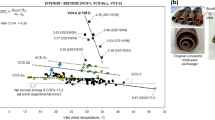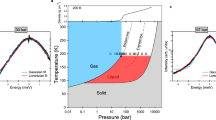Abstract
INVESTIGATIONS in this laboratory have shown that thermal change in gaseous organic compounds commonly leads to the formation of paired products through a single chemical process, so that, although the rate of change in the reactant is determined solely by initial concentration and temperature, the relative rates of formation of the products may be determined by other conditions. In such cases the initial rates of reaction show acceleration, the x t graphs being linear, or curved towards the x-axis; but after a relatively short period the slopes of the graphs suddenly diminish. Further, the main process seems generally to be associated with a primary or background process, represented by,leading to equilibrium in the system A, B, (C).
This is a preview of subscription content, access via your institution
Access options
Subscribe to this journal
Receive 51 print issues and online access
$199.00 per year
only $3.90 per issue
Buy this article
- Purchase on Springer Link
- Instant access to full article PDF
Prices may be subject to local taxes which are calculated during checkout
Similar content being viewed by others
References
J. Soc. Chem. Ind., 53, 323 (1934).
Author information
Authors and Affiliations
Rights and permissions
About this article
Cite this article
TRAVERS, M. Mechanism of Thermal Change in Gaseous Organic Compounds. Nature 138, 967–968 (1936). https://doi.org/10.1038/138967a0
Issue Date:
DOI: https://doi.org/10.1038/138967a0
Comments
By submitting a comment you agree to abide by our Terms and Community Guidelines. If you find something abusive or that does not comply with our terms or guidelines please flag it as inappropriate.



